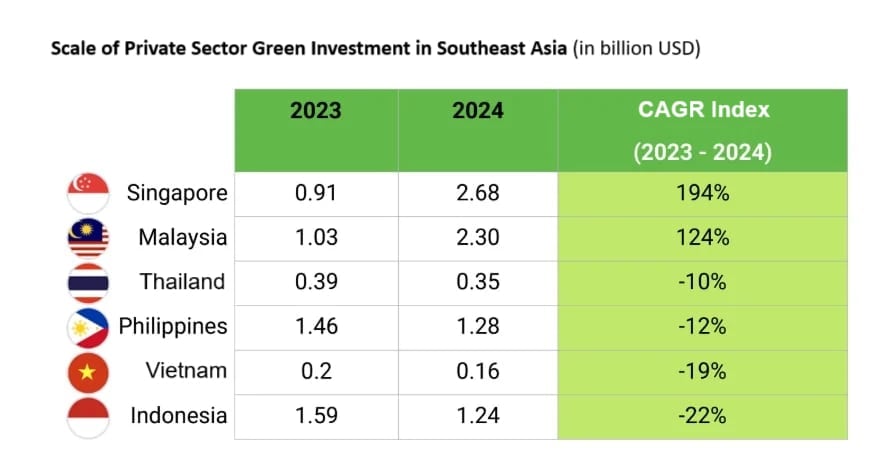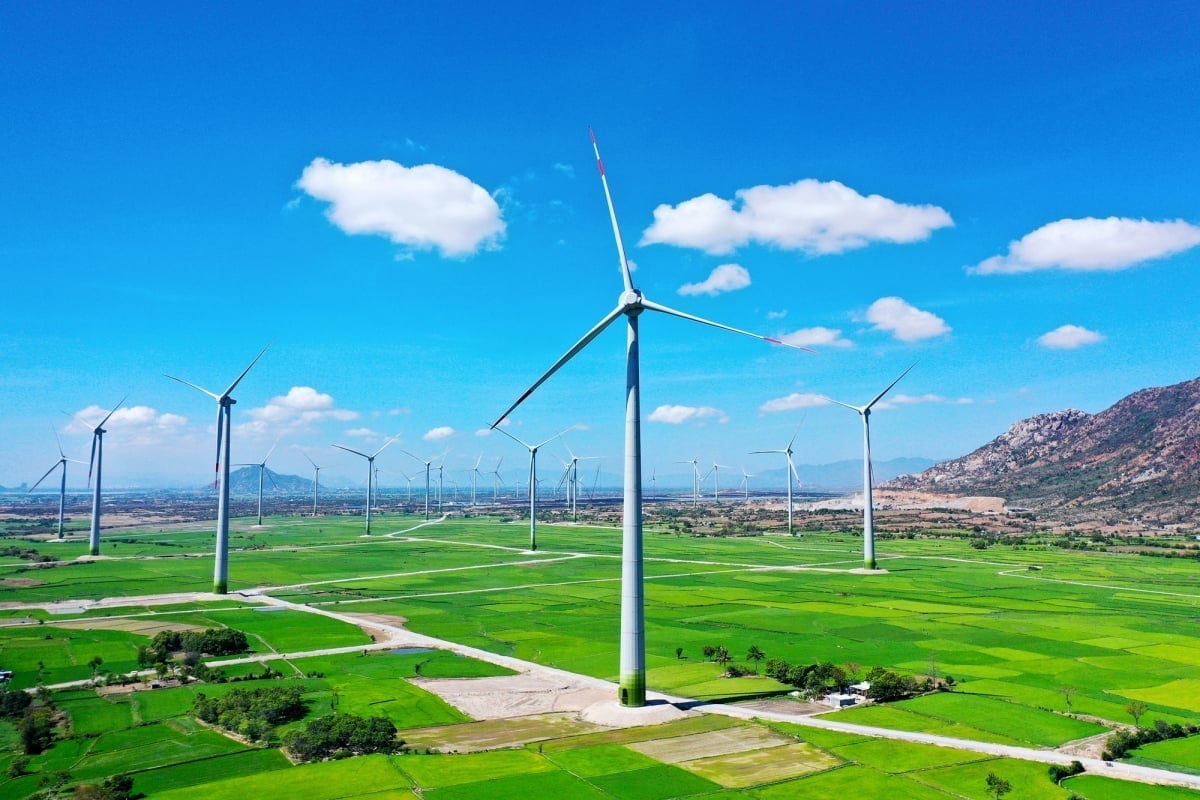June 17, 2025 | 02:37 GMT +7
June 17, 2025 | 02:37 GMT +7
Hotline: 0913.378.918
June 17, 2025 | 02:37 GMT +7
Hotline: 0913.378.918
The Southeast Asia Green Economy report, conducted jointly by Bain & Company, GenZero, Google, Standard Chartered, and Temasek, was recently released on May 6, 2025. The report introduces a systematic approach to promote growth and impact in the region.
According to the report, private green investments in the SEA-6 group (including Indonesia, Malaysia, Philippines, Singapore, Thailand, and Vietnam) reached USD 8 billion last year, marking a 43% increase from 2023.
Singapore and Malaysia lead in attracting private capital for green investments, reaching USD 2.68 and 2.3 billion respectively, with growth rates of 194% and 124% compared to the same period in 2023. Vietnam, along with Indonesia, Philippines, and Thailand, experienced a decrease in capital inflows in the double digits.

Vietnam among SEA-6 countries with highest renewable energy share of 43%. Photo: Southeast Asia Green Economy Report.
Notably, Vietnam has the highest share of renewable energy within the SEA-6 group, at 43%.
However, private sector green investment in Vietnam accounted for only about 2% of total investment value last year. The flow of green capital shifted from solar energy in 2023 to sectors such as transportation and wind power, with four deals recorded. Despite this diversification, the overall investment scale decreased by 19% compared to 2023.
According to the report, the Vietnamese government actively promotes national plans such as the Power Development Plan VIII, the National Master Plan on Energy, and the National Strategy on Climate Change to 2050. It is also expanding the power grid infrastructure and rolling out around 3,000 electric vehicle charging stations.
The report also notes that Southeast Asia accounts for 7.5% of global greenhouse gas emissions, remains heavily reliant on fossil fuels, and is highly vulnerable due to a lack of control over its rising emissions trajectory. As a result, governments must take urgent action to change this course and meet climate goals.
Franziska Zimmermann, Executive Director for Sustainability at Temasek, emphasized that with only five years left until 2030, the window for meaningful climate action is rapidly closing. She stressed the need to accelerate progress and focus on practical, short-term impact solutions.
Experts highlight that Southeast Asia must rapidly scale up sustainable agriculture, next-generation power grids, and electric vehicle (EV) ecosystems. Agriculture, while generating 25-30% of employment through key sectors like palm oil, rubber, and rice, also contributes to 30% of emissions and deforestation. Structural challenges such as fragmented production, weak infrastructure, complex legal systems, and an underdeveloped carbon market hinder progress. Sustainable solutions include increasing product value, promoting biofuels, reforming land-use rights, and strengthening supply chains.
In the energy sector, the report recommends ASEAN countries expand and modernize their domestic power grids while boosting cross-border energy connectivity.
Road transport is a major source of emissions, yet EV adoption across Southeast Asia remains low. A dual strategy is required, stimulating demand and expanding domestic EV manufacturing—to maintain the region’s production advantages and reduce emissions. Regional cooperation is also essential to build supply chains for batteries, EVs, and charging infrastructure, capitalizing on local resource availability.

The Vietnamese Government is actively advancing national plans such as Power Development Plan VIII and the National Master Plan on Energy, creating numerous opportunities for investors. Illustration.
In addition, Southeast Asia faces a potential shortfall of over USD 50 billion in green capital, with challenges likely to intensify amid macroeconomic uncertainties. Therefore, promoting enabling policies, developing human resources, and fostering public-private partnerships are key to unlocking progress. ASEAN countries also need to develop support mechanisms for climate finance and energy transition, as well as build carbon markets and explore the potential of green artificial intelligence (Green AI).
AI also contributes to reducing greenhouse gas emissions by 3-5% in high-emission sectors such as nature-based agriculture, energy, and transportation. However, to fully unlock this potential, governments need to make targeted investments, enact supportive policies, and promote large-scale adoption of AI.
More importantly, the report suggests that ASEAN countries must ensure competitive energy pricing to attract investment in renewable energy projects. The region also needs to establish compliance mechanisms, transparent registries, and trading platforms to build trust in the carbon credit market.
Translated by Kieu Chi

(VAN) The working delegation from the Ministry of Agriculture and Environment conducted an important trip to the Netherlands to strengthen strategic partnerships and sustainable development in the agricultural sector.

(VAN) The letter ‘A Plea from the Ocean’ not only evokes emotion but also awakens the human conscience to the responsibility of protecting life on Earth.

(VAN) The Department of Agriculture in South Africa has announced the country’s first mass vaccination of poultry to prevent local birds from contracting avian influenza.

(VAN) Establishment of the Mekong Delta Regional Agricultural Linkage Center, aiming for a closed value chain, deep processing, trading platforms, and international market connectivity.

(VAN) Gia Lai province has recently recorded 460 rare species of animals and plants, contributing to forest conservation and biodiversity planning in the region.

(VAN) Ms. Caroline Beresford, New Zealand Ambassador to Vietnam, expressed confidence that agricultural cooperation between Vietnam and New Zealand will develop sustainably, be climate-resilient, and promote gender equality.

(VAN) Vietnam reaffirms its commitment to international cooperation in fostering sustainable and responsible fisheries while ensuring resilient livelihoods for small-scale fishing communities.